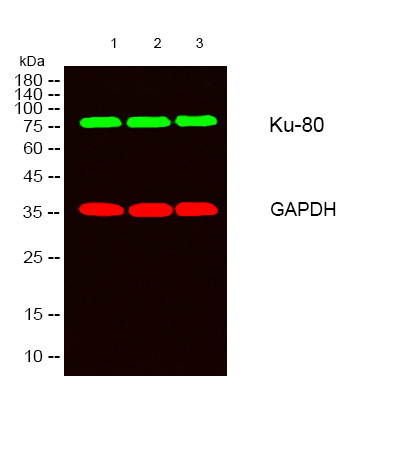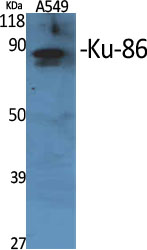eIF2B-ε (Phospho Ser540) rabbit pAb
- Catalog No.:YP1732
- Applications:WB
- Reactivity:Human;Mouse;Rat
- Target:
- eIF2B-ε
- Fields:
- >>Herpes simplex virus 1 infection
- Gene Name:
- EIF2B5 EIF2BE
- Protein Name:
- eIF2B-ε (Phospho-Ser540)
- Human Gene Id:
- 8893
- Human Swiss Prot No:
- Q13144
- Mouse Gene Id:
- 224045
- Mouse Swiss Prot No:
- Q8CHW4
- Rat Gene Id:
- 192234
- Rat Swiss Prot No:
- Q64350
- Immunogen:
- Synthesized peptide derived from human eIF2B-ε (Phospho-Ser540)
- Specificity:
- This antibody detects endogenous levels of eIF2B-ε (Phospho-Ser540) at Human, Mouse,Rat
- Formulation:
- Liquid in PBS containing 50% glycerol, 0.5% BSA and 0.02% sodium azide.
- Source:
- Polyclonal, Rabbit,IgG
- Dilution:
- WB 1:500-2000
- Purification:
- The antibody was affinity-purified from rabbit serum by affinity-chromatography using specific immunogen.
- Concentration:
- 1 mg/ml
- Storage Stability:
- -15°C to -25°C/1 year(Do not lower than -25°C)
- Other Name:
- Translation initiation factor eIF-2B subunit epsilon (eIF-2B GDP-GTP exchange factor subunit epsilon)
- Molecular Weight(Da):
- 79kD
- Background:
- This gene encodes one of five subunits of eukaryotic translation initiation factor 2B (EIF2B), a GTP exchange factor for eukaryotic initiation factor 2 and an essential regulator for protein synthesis. Mutations in this gene and the genes encoding other EIF2B subunits have been associated with leukoencephalopathy with vanishing white matter. [provided by RefSeq, Nov 2009],
- Function:
- disease:Defects in EIF2B5 are a cause of leukodystrophy with vanishing white matter (VWM) [MIM:603896]. VWM is a leukodystrophy that occurs mainly in children. Neurological signs include progressive cerebellar ataxia, spasticity, inconstant optic atrophy and relatively preserved mental abilities. The disease is chronic-progressive with, in most individuals, additional episodes of rapid deterioration following febrile infections or minor head trauma. While childhood onset is the most common form of the disorder, some severe forms are apparent at birth. A severe, early-onset form seen among the Cree and Chippewayan populations of Quebec and Manitoba is called Cree leukoencephalopathy. Milder forms may not become evident until adolescence or adulthood. Some females with milder forms of the disease who survive to adolescence exhibit ovarian dysfunction. This variant of the disorder is called
- Subcellular Location:
- nucleus,cytoplasm,cytosol,eukaryotic translation initiation factor 2B complex,
- Expression:
- Brain,Epithelium,Hepatocyte,Lung,Platelet,
- June 19-2018
- WESTERN IMMUNOBLOTTING PROTOCOL
- June 19-2018
- IMMUNOHISTOCHEMISTRY-PARAFFIN PROTOCOL
- June 19-2018
- IMMUNOFLUORESCENCE PROTOCOL
- September 08-2020
- FLOW-CYTOMEYRT-PROTOCOL
- May 20-2022
- Cell-Based ELISA│解您多样本WB检测之困扰
- July 13-2018
- CELL-BASED-ELISA-PROTOCOL-FOR-ACETYL-PROTEIN
- July 13-2018
- CELL-BASED-ELISA-PROTOCOL-FOR-PHOSPHO-PROTEIN
- July 13-2018
- Antibody-FAQs

